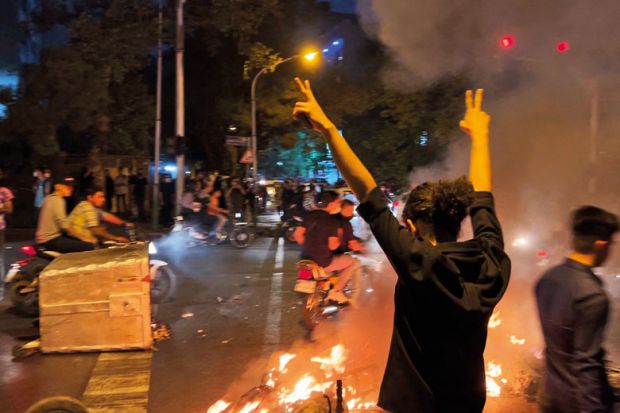As nationwide protests rock Iran for a fourth consecutive week, academics have largely stayed silent – something that could change if student pressure on faculty continues to mount.
On university campuses, the unrest has created a clear division. While students march in the streets to demand a takedown of Iran’s conservative government, most Iranian academics have avoided denouncing the regime, with many of them appearing to back it.
Last week, Iran’s state media published a statement in support of its rulers, which it claimed had been signed by 10,000 professors and university employees, condemning those inciting unrest in the country, calling them “enemies” responsible for “aimless riots” under the “false pretext of defending women”.
Although a small number of professors have “joined hands” with the students or even resigned from their posts, there has not yet been “organised action” by faculty, said Marjan Keypour Greenblatt, a non-resident scholar at the Middle East Institute, a US-based thinktank.
But pressure is mounting for them to take a stand.
In recent days, students shouting anti-government slogans have also decried professors who have “remained silent or took sides with the regime, calling them ‘bisharaf’, or ‘dishonorable’,” Ms Keypour Greenblatt noted.
At more than one university, students have called out their instructors for failing to support the opposition, chanting “the streets are full of blood but professors are bloody silent”.
“If the movement continues and more students persist with their strikes, we might witness a change in the behaviour of the faculty,” Ms Keypour Greenblatt said.
Still, she acknowledged the large disincentives preventing instructors from speaking out.
While some of them might be genuine regime loyalists, others could have financial reasons for keeping quiet, said Ms Keypour Greenblatt, noting a recent government announcement on prioritising teacher and retiree salaries.
Others might be motivated by fear, with the very real prospect of job loss and unemployment – as well as arrest and imprisonment – facing those who take to the streets.
Another scholar with knowledge of the country’s universities pointed out that far from all faculty support the student protesters. The academic, who asked not to be named for safety reasons, said Iran’s education system has for years weeded out candidates who could pose problems for the regime.
“To have a tenure-track job in Iran, each professor goes through various stages of evaluation, including religious and moral questioning – I have done that, and it is basically an interrogation with Islamic figures. These filters are there to give the maximum guarantee to the state that all universities in the country only host the most obedient citizens as their [tenure-track] faculty,” he said.
He noted that although the situation for non-tenured faculty was “more flexible”, they had smaller salaries and less status and power than tenured scholars.
While he was sceptical that professors would join protests, he was optimistic that widespread civil disobedience would continue.
“A page has been turned, and there seems to be no going back for anyone involved. The universities – faculty and staff – may join the majority of the people in Iran…if the other important players in Iranian society, especially the ‘bazaar’ – the traditional businessmen – join,” he said.
“But even if that does not happen, we know that the university students, along with the high schoolers, are advancing what that can only be labelled a revolution.”




